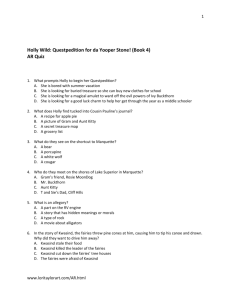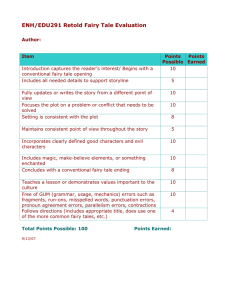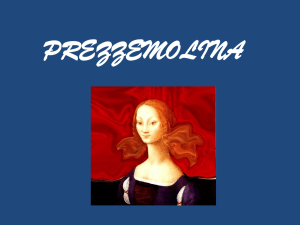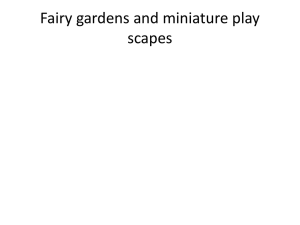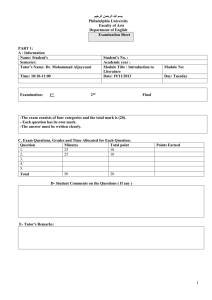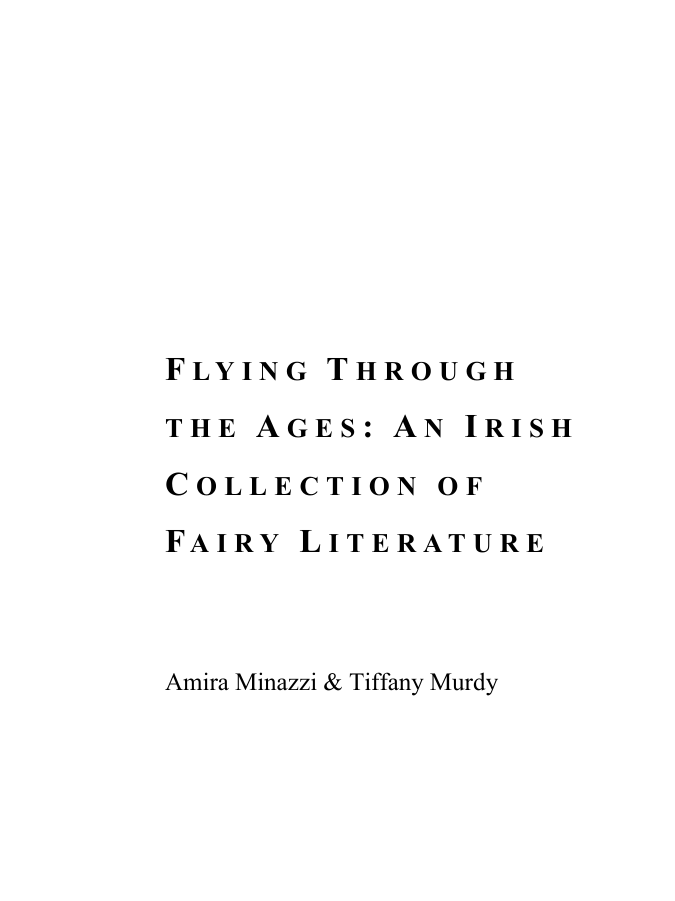
F LY I N G T H R O U G H
THE
AGES: AN IRISH
COLLECTION OF
FA I R Y L I T E R AT U R E
Amira Minazzi & Tiffany Murdy
Flying Through the Ages: An Irish Collection
of Fairy Litterature
Copyright © 2013 by Amira Minazzi &
Tiffany Murdy
All rights reserved. No part of this book may
be reproduced or transmitted in any form or
by any means without written permission of
the author.
Dedication page.
This anthology is dedicated to our families
and friends, and Dr. Kenneth Sherwood
Foreward
So, you like fairies, yeah? It’s a good
thing you picked up this book then
because it is filled with fairy literature
from the 19th and 20th centuries in
Ireland. These six short stories have been
selected carefully from a variety of old
Irish folklore about the “good folk” – the
fairies.
The Irish writer and novelist William
Carleton was born in 1794 and is the first
featured author in this anthology with his
piece “Frank Martin and the Fairies”. He
was often published in Dublin magazines
in the mid-1800’s. He was revered by his
work and a selection from Carleton’s
autobiography has an introduction written
by William Butler Yeats, who is featured
later in the anthology.
Thomas Crofton Crocker, author of
“The Priests Supper”, was born in 1978
in Buckingham Square, Cork, Ireland. A
very gifted man, Crocker was not only an
author, but also a songwriter and a very
popular artist in his country. After his
father’s death in 1818 he traveled to
London. In three years he returned to his
homeland, where he found his calling;
writing folklore literature. It was here, in
1825, that he wrote his first fairy book,
“Fairy Legends and Traditions of the
South of Ireland”.
Born in Ireland in 1824 to an English
father and an Irish mother, William
Allingham is the author of the first poem
appearing in our anthology, titled simply
“The Fairies”, written in 1867. Though
this poem has been used in many anthologies, he is better known for his published diaries. He had many encounters
with other well-known authors of his
time, such as Alfred Tennyson and
Thomas Carlyle, which he recorded in his
published diaries. His wife, Helen, who
was also very talented, did all of the
illustration in his works.
William Butler Yeats was born in
1865 in Dublin, Ireland and is one of the
most prominent figures in the literature
community. The Yeats family was very
artistic and the family moved to England
to expand their artistic endeavors in
1867. In 1888, Yeats wrote his first and
only fairy poem, “The Trooping Fairies”.
Although he is known for such works as
“The Second Coming”, this particular
poem is a gem and should not be discarded or forgotten.
“Connla and the Fairy Maiden”, was
written in 1862 by a very talented folklorist, literary critic, and historian, Joseph
Jacobs was born in 1854 in Australia and
translated this Irish piece as well as
writing for journals and books in his most
knowledgeable subject; folklore. He
produced many different series on fairies,
one of his most written subjects. While
he wrote many diverse fairytales, he most
often wrote those of Irish and Celtic
origin. You could say he enjoyed collecting the “duds” of folklore and worked to
create a sense of rejuvenation among
them.
The concluding piece in this anthology is a poem written in 1896 by Samuel
Ferguson. Born in 1810 in Belfast,
Ireland, Ferguson was an Irish poet,
barrister antiquarian, artist and public
servant. He is a predecessor to William
Butler Yeats and paved the way for many
Irish writers that came after him. His
love of literature came from his mother
who enjoyed reading the works of
William Shakespeare, Walter Scott and
Percy Bysshe Shelly. He received his
education at the Belfast Academy and
eventually moved to Dublin to study law
at Trinity College. Because he came from
such a humble backgrounds, he had to
support himself through his colligate
career, turning to Blackwood’s Magazine
where he was a published writer. It was
during this time he found his love for
writing of Irish folklore.
Hopefully this collection of Irish fairy
tales intrigues, captivates and enlightens
you. The fairies you are about to encounter are not your typical Tinkerbell sweethearts. These tricksters will keep you
glancing over your shoulder and on your
toes. Proceed with caution, keep an open
mind, and whatever you do, don’t hum
their tunes.
Fondly yours,
Amira Minazzi
Tiffany Murdy
Table of Contents
Connla and the Fairy
Maiden . . . . . . . . . . . . . . . . . . . . . Pg. 1
The Trooping Fairies . . . . . . . . . . Pg. 10
The Fairies . . . . . . . . . . . . . . . . . . Pg. 19
Frank Martin and
the Fairies. . . . . . . . . . . . . . . . . . . . Pg. 24
The Priests Supper . . . . . . . . . . . . Pg. 39
The Fairy Well
of Lagnanay . . . . . . . . . . . . . . . . . Pg. 53
Notes
CONNLA AND THE FAIRY MAIDEN
Joseph Jacobs
1892
Connla of the Fiery Hair was son of
Conn of the Hundred Fights. One day, as
he stood by the side of his father on the
height of Usna, he saw a maiden clad in
strange attire coming towards him.
“Where do you come from, maiden?"
said Connla.
"I come from the Plains of the Ever
Living," she replied, "where there is
neither death nor sin. There we always
1
Minazzi & Murdy
keep holiday and we do not need help
from any in eliciting our joy. And in all
our pleasure we have no strife; and
because we have our homes in the round
green hills. men call us the Hill Folk."
The king, and all with him, wondered
much to hear a voice when they saw no
one. For save Connla alone, none saw the
Fairy Maiden.
"To whom are you speaking to, my
son?" said Conn the king.
The maiden answered, "Connla
speaks to a young, fair maid, whom
neither death nor old age awaits. I love
Connla, and now I call him away to the
2
Flying Through the Ages
Plain of Pleasure, Moy Mell, where
Boadag is king for all. Nor has there
been complaint or sorrow in that land
since he has held the kingship. Oh, come
with me, Connla of the Fiery Hair, bright
as the dawn with your tawny skin. A
fairy crown awaits you to grace your
comely face and royal form. Come, and
never shall your comeliness fade, nor
your youth, until the last awful day of
judgment."
The king feared what the maiden said,
which he heard though he could not see
her and called aloud to his Druid, Coran,
by name.
3
Minazzi & Murdy
"Oh, Coran of the many spells," he
said, "and of the cunning magic, I call
upon your aid. A task is upon me, too
great for all my skill and wit, greater than
any laid upon me since I seized the
kingship. A maiden unseen has met us,
and by her power would take from me
my dear, my comely son. If you will help
not, he will be taken from your king by
woman's wiles and witchery."
Then Coran the Druid stood forth and
chanted his spells towards the spot where
the maiden's voice had been heard. Then
no one could hear her voice again, nor
could Connla see her longer. Only as she
4
Flying Through the Ages
vanished before the Druid's mighty spell,
she threw an apple to Connla.
For a whole month from that day,
Connla would take nothing to eat or to
drink, save only from that apple. But
even as he ate it, the apple continued to
grow again and was always kept whole.
And all the while there grew within him a
mighty yearning and longing after he had
seen the fair maiden.
But when the last day of the month of
waiting came Connla stood by the side of
the king, his father, on the Plain of
Arcomin, and again he saw the maiden
5
Minazzi & Murdy
come towards him. And again she spoke
to him.
"'Tis a glorious place that Connla
holds among short-lived mortals awaiting
the day of death; but now the folk of life,
the ever-living ones, beg and bid you
come to Moy Mell, the Plain of Pleasure.
The other fairies have learned about you,
and they have seen you in your home
among your dear ones."
When Conn the king heard the
maiden's voice he called to his men aloud
and said: "Summon swift my Druid
Coran, for I see she has again this day the
power of speech."
6
Flying Through the Ages
Then the maiden replied: "Oh mighty
Conn, fighter of a hundred fights, the
Druid's power is little loved; it has little
honor in the mighty
land, peopled with so many of the
upright. When the Law will come, it will
do away with the Druid's magic spells
that come from the lips of the false black
demon."
Then Conn the king observed that
since the maiden came, Connla spoke to
no one that spoke to him.
So, Conn of the hundred fights said to
him: "Is it to your mind what the woman
says, my son?"
7
Minazzi & Murdy
"It is hard upon me," said Connla; "I
love my own folk above all things. But
yet - but yet, a longing seizes me for the
maiden."
When the maiden heard this, she
answered and said, "The Ocean is not so
strong as the waves of your longing.
Come with me in my curragh, the gleaming, straight-gliding crystal canoe. Soon
we can reach Boadag's realm. I see the
bright sun sink, yet far as it is, we can
reach it before dark. There is also another
land worthy of your journey, a land
joyous to all that seek it. Only wives and
maidens dwell there. If you would like
8
Flying Through the Ages
we can seek it and live there alone
together in joy."
When the maiden ceased to speak,
Connla of the Fiery Hair rushed away
from them and sprang into the curragh.
And then, the king and court saw it glide
away over the bright sea towards the
setting sun. Away and away they sailed,
till eye could see it no longer, Connla
and the Fairy Maiden went their way on
the sea and were seen no more, nor did
they remember from where they came.
9
THE TROOPING FAIRIES
William Butler Yeats
1888
The Irish word for fairy is
“sheehogue”, [idheóg], which is a
diminutive of "shee" in “banshee”.
Fairies are “deenee shee” [daoine sidhe]
or fairy people.
Who are they? The peasants say,
"Fallen angels who were not good
enough to be saved nor bad enough to be
lost."
"The gods of the earth," says the
Book of Armagh.
10
"The gods of pagan Ireland," say the
Irish antiquarians, "the Tuatha De Danān,
who when no longer worshipped and fed
with offerings, dwindled away in the
popular imagination and now are only a
few spans high." And they will tell you
that the names of fairy chiefs are the
names of old Danān heroes, and the
places where they especially gather
together, Danān burying-places, and that
the Tuath De Danān used to be called the
“slooa-shee” [sheagh sidhe] (the fairy
host), or ”Marcra shee” (the fairy cavalcade).
11
Minazzi & Murdy
On the other hand, there is much
evidence to prove them fallen angels.
Witness the nature of the creatures: their
caprice, their way of being good to the
good and evil to the evil, having every
charm but conscience consistency.
Beings so quickly offended that you must
not speak much about them at all and
never call them anything but the "gentry"
or else “daoine maithe” (which in English
means good people). They are so easily
pleased and will do their best to keep
misfortune away from you, if you leave a
little milk for them on the windowsill
overnight. On the whole, the popular
12
Flying Through the Ages
belief tells us most about them-- telling
us how they fell, and yet were not lost,
because their evil was wholly without
malice.
Are they "the gods of the earth?"
Perhaps! Many poets and all mystic and
occult writers, in all ages and countries,
have declared that behind the visible are
chains on chains of conscious beings.
They are not of heaven but of the earth,
who have no inherent form but change
according to their whim or the mind that
sees them. You cannot lift your hand
without influencing and being influenced
by hoards. The visible world is merely
13
Minazzi & Murdy
their skin. In dreams we go amongst
them, and play with them and combat
with them. They are, perhaps, human
souls in the crucible--these creatures of
whim.
Do not think the fairies are always
little. Everything is capricious about
them, even their size. They seem to take
what size or shape pleases them. Their
chief occupations are feasting, fighting,
making love and playing the most
beautiful music. They have only one
industrious person amongst them, the
“lepra-caun” (the shoemaker).
14
Flying Through the Ages
They wear their shoes out by dancing.
Near the village of Ballisodare is a little
woman who lived amongst them for
seven years. When she came home, she
had no toes; she had danced them off.
They have three great festivals in the
year--May Eve, Midsummer Eve, November Eve. On May Eve, every seventh
year, they fight all round on the "Plain-aBawn" (wherever that is), for the harvest.
The best ears of grain belong to them. An
old man told me he saw them fight once;
they tore the thatch off a house in the
midst of it all. Had anyone else been near
they would merely have seen a great
15
Minazzi & Murdy
wind whirling everything into the air as it
passed. When the wind makes the straws
and leaves whirl as it passes, that is the
fairies, and the peasantry take off their
hats and say, "God bless them."
On Midsummer Eve the bonfires are
lit on every hill in honor of St. John, and
the fairies are at their gayest, sometimes
stealing away beautiful mortals to be
their brides.
On November Eve they are at their
gloomiest, for according to the old Gaelic
reckoning, this is the first night of winter.
This night they dance with the ghosts, the
“pooka” is abroad, witches make their
16
Flying Through the Ages
spells, and girls set a table with food in
the name of the devil, hoping their future
lover may come through the window and
eat of the food. After November Eve the
blackberries are no longer wholesome,
for the “pooka” has spoiled them.
When they are angry, they paralyze
men and cattle with their fairy darts.
When they are gay, they sing. Many a
poor girl has heard them and pined away,
even dying for love of that singing.
Plenty of the old beautiful tunes of
Ireland are only their music caught up by
eavesdroppers. No wise peasant would
hum "The Pretty Girl Milking the Cow"
17
Minazzi & Murdy
near a fairy’s dwelling, for they are
possesive, and do not like to hear their
songs on clumsy mortal lips. Carolan, the
last of the Irish bards, slept on a stronghold and ever after the fairy tunes ran in
his head making him the great man he
was.
18
THE FAIRIES
William Allingham
1867
Up the airy mountain,
down the rushing glen,
we daren't go a-hunting
for fear of little men;
Wee folk, good folk,
trooping all together;
Green jacket, red cap,
and a white owl's feather!
Down along the rocky shore
19
Minazzi & Murdy
some make their home,
they live on crispy pancakes
of yellow tide foam;
Some in the reeds
of the black mountain lake,
with frogs for their watch dogs
all night awake.
High upon the hill-top
the old King sits;
He is so old and gray
he's nearly lost his wits.
With a bridge of white mist
Columbkill he crosses
on his stately journeys
from Slieveleague to Rosses;
20
Flying Through the Ages
Or going up with music
on cold and starry nights
to sup with the Queen
of the gay Northern Lights.
They stole little Bridget
for seven years, so long;
When she came down again
her friends they were all gone.
They took her lightly back,
between the night and morrow,
they thought that she was fast asleep,
but she was dead with sorrow.
They have kept her ever since
deep within the lake,
on a bed of flag leaves,
21
Minazzi & Murdy
watching till she wakes.
By the craggy hillside,
through the mosses bare,
they have planted thorn trees
for pleasure here and there.
Is any man so daring
as dig them up in spite;
He shall find their sharpest thorns
in his bed at night.
Up the airy mountain,
down the rushing glen,
we daren't go a-hunting
For fear of little men;
Wee folk, good folk,
trooping all together;
22
Flying Through the Ages
Green jacket, red cap,
and a white owl's feather
23
FRANK MARTIN AND THE FAIRIES
William Carleton
1845
Martin was a thin pale man of a
sickly look, and a constitution naturally
feeble when I saw him. His hair was a
light auburn, his beard unshaven and his
hands of a singular delicacy and whiteness owing, I dare say, as much to the
soft and easy nature of his employment
as to his infirm health. In everything else
he was as sensible, somber and rational
as any other man; but on the topic of
fairies, the man's mania was peculiarly
24
Flying Through the Ages
strong and immovable. Indeed, I remember that the expression of his eyes were
wild and hollow and his long narrow
temples sallow and emaciated.
This man did not lead an unhappy
life, nor did the malady he worked for
seem to be productive of either pain or
terror to him, although one might be apt
to imagine otherwise. On the contrary, he
and the fairies maintained the most
friendly intimacy and their dialogues-which I fear were woefully one-sided
ones--must have been a source of great
pleasure to him, for they were conducted
25
Minazzi & Murdy
with much mirth and laughter, on his part
at least.
"Well Frank, when did you see the
fairies?"
"Well there's two dozen of them in
the shop (the weaving shop) this minute.
There's a little old fellow sittin' on the top
of the slays an' all to be rocked while I'm
weavin'. The sorrow's in them, but they're
the greatest little scammers alive, so they
are. See, there's another of them at my
dressin' noggin. Go out o' that, you
shingawn; or, bad cess to me, if you
don't, but I'll leave you a mark. Ha! out,
you thief you!"
26
Flying Through the Ages
"Frank, arn't you afeard o' them?"
"Is it me! Arra, what would I be
afeard o' them for? Sure they have no
power over me."
"And why haven't they, Frank?"
"Because I was baptized against
them."
"What do you mean by that?"
"Why, the priest that christened me
was told by my father, to put in the
proper prayer against the fairies--an' a
priest can't refuse it when he's asked an'
he did so. Begorra, it's well for me that he
did (let the tallow alone, you little
glutton. See, there's a weeny thief o' them
27
Minazzi & Murdy
aitin' my tallow) because, you see, it was
their intention to make me king o' the
fairies."
"Is it possible?"
"Devil a lie in it. Sure you may ax
them, an' they'll tell you."
"What size are they, Frank?"
"Oh, little wee fellows, with green
coats, an' the purtiest little shoes ever you
seen. There's two of them--both old
acquaintances o' mine; runnin' along the
yarn beam. That old fellow with the bobwig is called Jim Jam an' the other chap,
with the three-cocked hat, is called
Nickey Nick. Nickey plays the pipes.
28
Flying Through the Ages
Nickey, give us a tune, or I'll malivogue
you, come now, 'Lough Erne Shore.' Well
now, listen!"
The poor fellow, though weaving as
fast as he could all the time, yet bestowed
every possible mark of attention to the
music and seemed to enjoy it as much as
if it had been real.
But who can tell whether that which
we look upon as a privation may not after
all be a fountain of increased happiness,
greater perhaps, than any which we
ourselves enjoy? I forget who the poet is
who says—
"Mysterious are thy laws;
29
Minazzi & Murdy
The vision's finer than the view;
Her landscape Nature never drew
so fair as Fancy draws."
Many a time when I was a mere
child, not more than six or seven years of
age, have I gone as far as Frank's weaving-shop in order with a heart divided
between curiosity and fear, to listen to his
conversation with the good people. From
morning till night his tongue was going
almost as incessantly as his shuttle; and it
was well known that at night, whenever
he awoke out of his sleep, the first thing
he did was to put out his hand and push
them, as it were, off his bed.
30
Flying Through the Ages
"Go out o' this, you thieves, you, go
out o' this now, an' letme alone. Nickey,
is this any time to be playing the pipes,
and me wants to sleep? Go off, now, troth
if yez do, you'll see what I'll give yez tomorrow. Sure I'll be makin' new dressin's;
and if yez behave decently, maybe I'll
leave yez the scrapin' o' the pot. There
now. Ouch! poor things, they're dacent
crathurs. Sure they're all gone, barrin'
poor Red-cap, that doesn't like to leave
me." And then the harmless monomaniac
would fall back into what we trust was an
innocent slumber.
31
Minazzi & Murdy
About this time there was said to
have occurred a very remarkable circumstance, which gave poor Frank a vast deal
of importance among the neighbors. A
man named Frank Thomas, the same in
whose house Mickey M'Rorey held the
first dance at which I ever saw him, as
detailed in a former sketch; this man, I
say, had a child sick but of what complaint I cannot now remember nor is it of
any importance. One of the gables of
Thomas's house was built against, or
rather into, a Forth or Rath called Towny
or properly Tonagh Forth. It was said to
be haunted by the fairies and what gave it
32
Flying Through the Ages
a character peculiarly wild in my eyes
was, that there were on the southern side
of it two or three little green mounds,
which were said to be the graves of unchristened children; it was considered
dangerous and unlucky to pass.
The season was mid-summer and one
evening about dusk, during the illness of
the child, the noise of a handsaw was
heard upon the Forth. This was considered rather strange and after a little time,
a few of those who were assembled at
Frank Thomas's went to see who it could
be that was sawing in such a place or
what they could be sawing at so late an
33
Minazzi & Murdy
hour, for everyone knew that nobody in
the whole country about them would dare
to cut down the few white thorns that
grew upon the Forth. When looking
further, after surrounding and searching
the whole place, they could discover no
trace of neither saw or sawer. In fact,
with the exception of themselves, there
was no one, either natural or supernatural, visible. They then returned to the
house and had barely sat down, when it
was heard again within ten yards of them.
Another examination of the premises
took place but with equal success. Now
however, while standing on the Forth
34
Flying Through the Ages
they heard the sawing in a little hollow
about a hundred and fifty yards below
them, which was completely exposed to
their view, but they could see nobody. A
party of them immediately went down to
look, if possible, what this noise and
invisible labor could mean. On arriving at
the spot they heard the sawing, to which
were now added hammering and the
driving of nails upon the Forth above,
while those who stood on the Forth
continued to hear it in the hollow. On
comparing notes, they resolved to send
down to Billy Nelson's for Frank Martin,
a distance of only about eighty or ninety
35
Minazzi & Murdy
yards. He was soon on the spot, and
without a moment's hesitation solved the
enigma.
"'Tis the fairies," said he. "I see them,
and busy crathurs they are."
"But what are they sawing, Frank?"
"They are makin' a child's coffin," he
replied, "they have the body already
made, an' they're now nailin' the lid
together."
That night the child died and the story
goes that on the second evening afterwards, the carpenter who was called upon
to make the coffin brought a table out
from Thomas's house to the Forth, as a
36
Flying Through the Ages
temporary bench; and it is said, that the
sawing and hammering necessary for the
completion of his task were precisely the
same which had been heard the evening
but one before; neither more nor less. I
remember the death of the child myself
and the making of its coffin, but I think
the story of the supernatural carpenter
was not heard in the village for some
months after its interment.
Frank had every appearance of a
sickly, worn down man. At the time I saw
him, he might be about thirty-four years
of age but I do not think, from the
debility of his frame and infirm health,
37
Minazzi & Murdy
that he would alive for several years to
come. He was an object of considerable
interest and curiosity and often have I
been present when he was pointed out to
strangers as "the man that could see the
good people."
38
THE PRIEST'S SUPPER
T. Crofton Croker
1838
It is said by those who ought to
understand such things, that the good
people (the fairies) are some of the angels
who were turned out of heaven and who
landed on their feet in this world, while
the rest of their companions (who had
more sin to sink them) went down farther
to a worse place. Be this as it may, there
was a merry troop of the fairies dancing
and playing all manner of wild pranks on
a bright moonlight evening towards the
39
Minazzi & Murdy
end of September. The scene of their
merriment was not far distant from
Inchegeela, in the west of the county
Cork. A poor village, although it had a
barrack for soldiers with great mountains
and barren rocks. However, as the fairies
can have everything they want for
wishing, poverty does not trouble them
and all their care is to seek out unfrequented nooks and places where it is not
likely any one will come to spoil their
sport.
On a nice green ground by the
river's side were the little fellows dancing
in a ring as gaily as may be, with their
40
Flying Through the Ages
red caps wagging about at every bound in
the moonshine. So light were these
bounds that the lobs of dew, although
they trembled under their feet, were not
disturbed by their capering. Thus did they
carry on their gambols, spinning round
and round, twirling, bobbing, diving and
going through all manner of figures, not
until one of them chirped out,
"Cease, cease, with your drumming,
Here's an end to our mumming;
By my smell
I can tell
A priest this way is coming!"
41
Minazzi & Murdy
And away every one of the fairies
scampered off as hard as they could,
concealing themselves under the green
leaves of the lusmore where if their little
red caps should happen to peep out, they
would only look like its crimson bells.
More hid themselves at the shady side of
stones and brambles while others under
the bank of the river and in holes and
crannies of one kind or another.
The fairy speaker was not mistaken; for along the road which was within
view of the river, came Father Horrigan
on his pony, thinking to himself that as it
42
Flying Through the Ages
was so late he would make an end of his
journey at the first cabin he came to.
According to this determination, he
stopped at the dwelling of Dermod Leary,
lifted the latch and entered with "My
blessing on all here."
I need not say that Father Horrigan was a welcome guest wherever he
went, for no man was more pious or
better beloved in the country. Now it was
a great trouble to Dermod that he had
nothing to offer his reverence for supper
as a relish to the potatoes, which "the old
woman," for so Dermod called his wife
(though she was not much past twenty)
43
Minazzi & Murdy
had potatoes boiling in a pot over the fire.
He thought of the net which he had set in
the river but as it had been there only a
short time, the chances were against his
finding a fish in it. ‘No matter,’ thought
Dermod, ‘there can be no harm in stepping down to try; and maybe, as I want
the fish for the priest's supper, that one
will be there before me.’
Down to the riverside went Dermod and he found in the net as fine a
salmon as ever jumped in the bright
waters of “The Spreading Lee;" but as he
was going to take it out, the net was
pulled from him, he could not tell how or
44
Flying Through the Ages
by whom, and away got the salmon and
went swimming along with the current as
gaily as if nothing had happened.
Dermod looked sorrowfully at the
wake which the fish had left upon the
water, shining like a line of silver in the
moonlight, and then with an angry
motion of his right hand and a stamp of
his foot, gave vent to his feelings by
muttering, "May bitter bad luck attend
you night and day for a blackguard
schemer of a salmon, wherever you go!
You ought to be ashamed of yourself, if
there's any shame in you to give me the
slip after this fashion! And I'm clear in
45
Minazzi & Murdy
my own mind you'll come to no good, for
some kind of evil thing or other helped
you! Did I not feel it pull the net against
me as strong as the devil himself?"
"That's not true for you," said one
of the little fairies who had scampered off
at the approach of the priest, coming up
to Dermod Leary with a whole throng of
companions at his heels. "There were a
dozen and a half of us pulling against
you."
Dermod gazed on the tiny speaker
with wonder, who continued, "Make
yourself uneasy about the priest's supper;
for if you will go back and ask him one
46
Flying Through the Ages
question from us, there will be as fine a
supper as ever was put on a table spread
out before him in less than no time."
"I'll have nothing at all to do with
you," replied Dermod in a tone of determination but after a pause he added, "I'm
much obliged to you for your offer, sir,
but I know better than to sell myself to
you, or the like of you, for a supper.
More than that, I know Father Horrigan
has more regard for my soul than to wish
me to pledge it forever out of regard to
anything you could put before him. So
there's an end of the matter."
47
Minazzi & Murdy
The little speaker, with a pertinacity not to be repulsed by Dermod's
manner, continued, "Will you ask the
priest one civil question for us?"
Dermod considered for some time
and he was right in doing so, but he
thought that no one could come to harm
out of asking a civil question. "I see no
objection to do that same, gentlemen,"
said Dermod. "But I will have nothing in
life to do with your supper, mind that."
"Then," said the little speaking
fairy, whilst the rest came crowding after
him from all parts, "go and ask Father
Horrigan to tell us whether our souls will
48
Flying Through the Ages
be saved at the last day, like the souls of
good Christians, and if you wish us well,
bring back word what he says without
delay."
Away went Dermod to his cabin,
where he found the potatoes thrown out
on the table and his good woman handing
the biggest of them all, a beautiful
laughing red apple, smoking like a hardridden horse on a frosty night, over to
Father Horrigan.
"Please your reverence," said
Dermod after some hesitation, "may I
make bold to ask your honor one question?"
49
Minazzi & Murdy
"What may that be?" said Father
Horrigan.
"Why then, begging your reverence's pardon for my freedom, it is: If the
souls of the good people are to be saved
at the last day?"
"Who bid you ask me that question, Leary?" said the priest, fixing his
eyes upon him very sternly which Dermod could not stand before at all.
"I'll tell no lies about the matter
and nothing in life but the truth," said
Dermod. "It was the good people themselves who sent me to ask the question
and there they are in thousands down on
50
Flying Through the Ages
the bank of the river, waiting for me to go
back with the answer."
"Go back by all means," said the
priest, "and tell them, if they want to
know, to come here to me themselves and
I'll answer that or any other question they
are pleased to ask, with the greatest
pleasure in life."
Dermod accordingly returned to
the fairies, who came swarming round
about him to hear what the priest had said
in reply. Dermod spoke out among them
like a bold man as he was, but when they
heard that they must go to the priest,
away they fled, some here and more there
51
Minazzi & Murdy
and some this way and more that, whisking by poor Dermod so fast and in such
numbers that he was quite bewildered.
When he came to himself, which
was not for a long time, back he went to
his cabin and ate his dry potatoes along
with Father Horrigan, who made quite
light of the thing. However, Dermod
could not help thinking it a mighty hard
case that his reverence, whose words had
the power to banish the fairies at such a
rate, should have no sort of relish to his
supper and that the fine salmon he had in
the net should have been got away from
him in such a manner.
52
THE FAIRY WELL OF LAGNANAY
Samuel Ferguson
1896
Mournfully, sing mournfully-"O listen, Ellen, sister dear:
Is there no help at all for me,
but only ceaseless sigh and tear?
Why did not he who left me here,
with stolen hope steal memory?
O listen, Ellen, sister dear,
(Mournfully, sing mournfully)
I'll go away to Sleamish hill,
I'll pluck the fairy hawthorn tree,
and let the spirits work their will;
53
Minazzi & Murdy
I care not if for good or ill,
so they but lay the memory
which all my heart is haunting still!
(Mournfully, sing mournfully)
The Fairies are a silent race,
and pale as lily flowers to see;
I care not for a blanched face,
for wandering in a dreaming place,
so I but banish memory:
I wish I were with Anna Grace!"
Mournfully, sing mournfully!
Hearken to my tale of woe-'It was thus to weeping Ellen Con,
her sister said in accents low,
54
Flying Through the Ages
her only sister, Una bawn:
'It was in their bed before the dawn,
and Ellen answered sad and slow,
"Oh Una, Una, be not drawn
(Hearken to my tale of woe)-To this unholy grief I pray,
which makes me sick at heart to know,
and I will help you if I may:
--The Fairy Well of Lagnanay-lie nearer me, I tremble so,
Una, I've heard wise women say
(Hearken to my tale of woe)-that if before the dews arise,
true maiden in its icy flow
55
Minazzi & Murdy
with pure hand bathe her bosom
thrice,
three lady-brackens pluck likewise,
and three times round the fountain go,
she straight forgets her tears and sighs."
Hearken to my tale of woe!
Ngift I can possibly ask for.
56
Notes
These atories were extracted from
Project Gutenburg :
http://www.gutenberg.org/. They were
edited for precision and modified to
present day vernacular.
Allingham, William, and Michael Hague.
The Fairies. N.p.: Michael O'Mara, 1990.
Print.
"Fairy and Folk Tales of the Irish Peasantry:
The Trooping Fairies: The Priest's
Supper, by T. Crofton Croker." Fairy
and Folk Tales of the Irish Peasantry:
The Trooping Fairies: The Priest's
Supper, by T. Crofton Croker. N.p., n.d.
Web. 11 Apr. 2013.
Jacobs, Joseph, and John Dickson Batten.
Celtic Fairy Tales. New York: Dover
Publications, 1968. Print.
Yeats, W. B. Fairy and Folk Tales of the
Irish Peasantry. London: W. Scott, 1888.
Print.
Yeats, W. B., Paul Muldoon, and Linda
Farquharson. Irish Fairy and Folk Tales.
London: Folio Society, 2007. Print.

